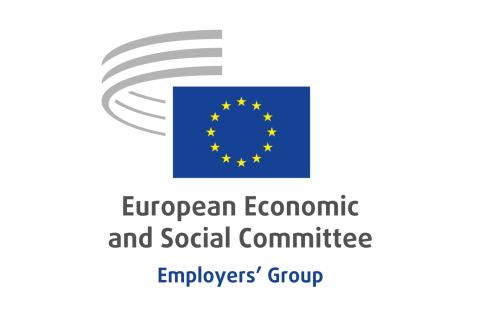European Economic
and Social Committee
Porto Social Summit: A wake up call for strengthening competitiveness
The Employers´ Group takes note of the Porto Declaration, and the Porto Social commitment, and considers them, together with the NEXTGENERATIONEU recovery fund and the MFF, as a valuable roadmap to guide Member States and the Union in their efforts towards major structural reforms, productive investments, growth, competitiveness, employment and well-being of people.
In times of uncertainty, turbulence and continuous change we must ensure that a collective, inclusive and cohesive recovery from the pandemic will strengthen Europe´s competitiveness, resilience and role on the global stage.
There is no social dimension without a sound economic foundation. Competitiveness and higher productivity based on skills and knowledge represent the sound recipe for maintaining the well-being of European societies. Economic growth, dynamic labour markets and a well-functioning internal market are preconditions for strengthening the social dimension of the EU. Now is the time to reinforce the strengths of our European social market economy system while removing the weaknesses.
Our Europe is and has always been social. Our social market economy is a global beacon – admired by many, envied by some. There is a wide-ranging social acquis framework which, whilst laying down founding principles, guides, complements and coordinates Member States´ social legislation and policies.
When it comes to implementing the EPSR, the Action Plan presented by the Commission provides useful guidance, including in the areas of employment, skills, health, and social protection.
It is however vital, that any initiative and measure included in the action plan must be taken at the right level, keeping in mind and fully respecting the different competences, powers and clearly defined roles the EU, Member States and social partners have as regards employment and social policy.
This requires rigorous respect of the principles of subsidiarity and proportionality, the different socio-economic environments and the diversity of national systems, including the role and autonomy of social partners. EU legislation should only be contemplated for truly cross-border issues.
If indeed the EU is to propose any new legislation, all such new initiatives at EU level must be based on clear evidence and thorough impact assessment. In this regard, we propose that a specific competitiveness check should be undertaken for all new initiatives.
The Employers' Group believes that the introduction and implementation of national reforms must happen in the framework of the open method of coordination and the European Semester. The revised Social Scoreboard proposed in the Action Plan should feed effectively into the European Semester so that it guides Member States in their labour market and social policy reforms.
The Employers´ Group particularly welcomes the focus of the Porto Declaration and the Action Plan on jobs and skills. Competitive sustainability is at the heart of Europe´s social market economy as stated in the introduction of the Action Plan. A strong and resilient economy, based on sound economic policies across Europe as well as on unleashing the productivity potential of skilled innovative workforce is the only foundation for truly inclusive and social dimension in Europe. With this approach, employers welcome the three EU headline targets to set the ambition for 2030.
Employment creation, however, is not about new legislation or other obligations increasing the burden of companies. This approach has not worked in the past. We need to courageously create labour markets where flexibility and businesses´ adaptability to change are accompanied by adequate security for workers. All work counts here: full-time, part-time, open-ended or temporary. Demographic change will also mean that we need adaptable and flexible national labour markets and welfare systems, as well as quality education systems.
The green and digital transitions will require more investment in education, vocational training, lifelong learning, upskilling and reskilling. This is where smooth cooperation between public actors and companies should be regarded as a winning strategy.
With regard to changes linked to digitalisation, artificial intelligence, teleworking and the platform economy we need to have a mind-set geared towards opening up opportunities, rather than creating obstacles to new innovation and economic models. As for ensuring adequate security for workers, new approaches and ways should be found notably through social dialogue at appropriate levels.
Jobs and wellbeing are created by thriving companies and entrepreneurs. With this goal in mind, the Employers´ Group is very much willing to play a constructive role in the implementation of the EPSR as well as in monitoring the progress in the framework of the European semester.
